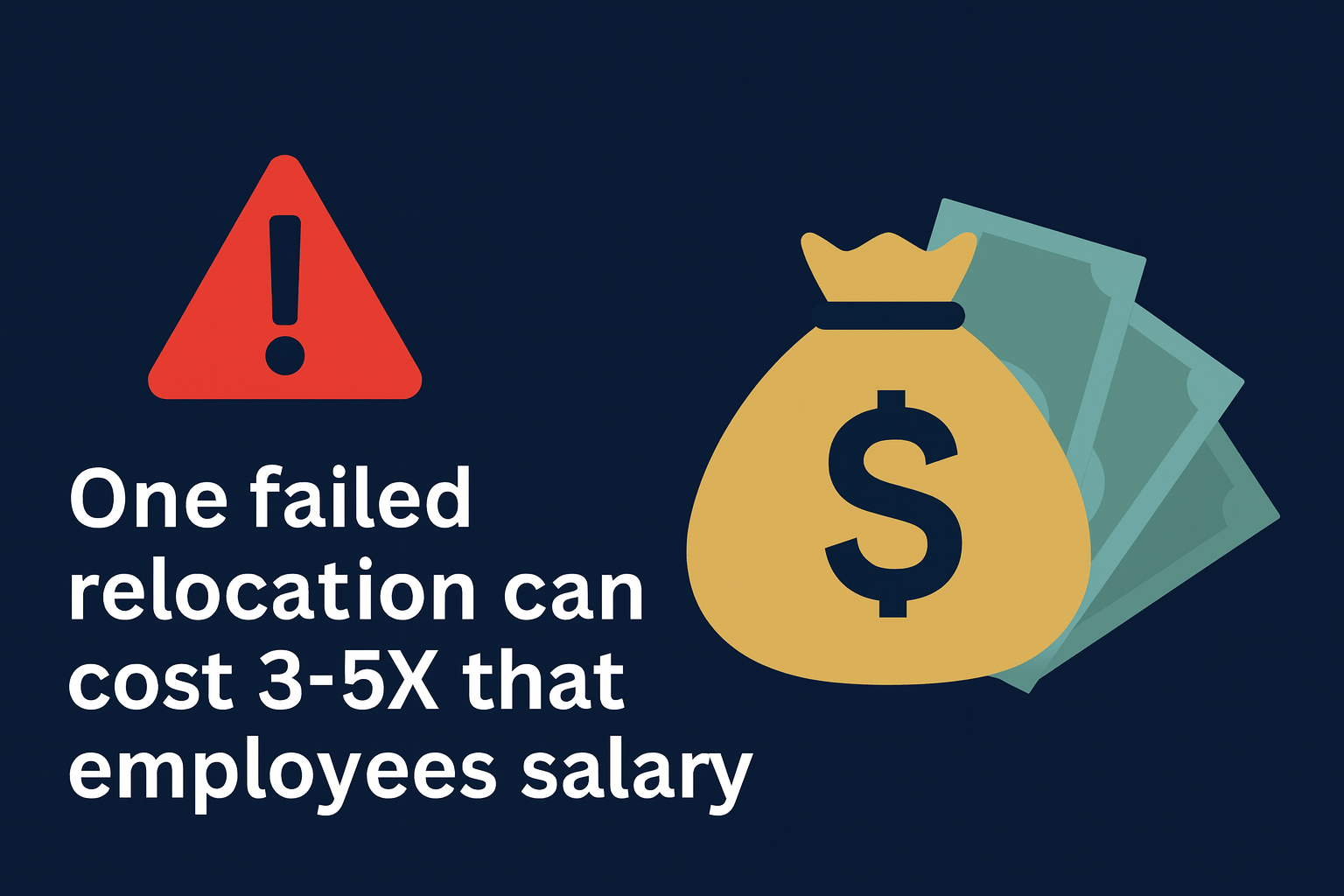Why Relocation Failures Are Quietly Killing Your Business
Understand the High Price of Doing it Wrong
When your top engineer accepts that dream role in your Seattle office, you’re celebrating a win. But here’s what most companies don’t see coming: there’s a 40% chance that move will fail within the first year. And when it does, you’re not just losing an employee—you’re bleeding money in ways that never show up on a single invoice.
Corporate relocation is a $25 billion industry for a reason. Companies spend an average of $16.2 million per year moving their people around. That’s not pocket change, and when things go wrong, those numbers multiply fast. The real damage isn’t always visible until it’s too late.
The Hidden Costs of a Failed Relocation
Let’s talk about what a failed relocation actually costs you. It starts with the obvious stuff—moving expenses, temporary housing, flights, settling-in allowances. You’ve already written those checks. Then there’s the repatriation costs when things fall apart, which means you’re essentially paying for the move twice.

One failed relocation can easily cost $150,000 to $200,000 once you factor in everything.
But that’s just the beginning. Your employee spent three months in limbo instead of contributing to your bottom line—that’s lost productivity you can’t get back.
The signing bonus and relocation incentives you offered?
Gone.
Now you’re back to square one, posting the job again and starting another search that’ll take months.
Here’s where it gets really expensive: replacing that employee costs 50-200% of their annual salary depending on the role. A senior developer making $150,000? You’re looking at another $75,000 to $300,000 to find and onboard their replacement. Add it all up and a single failed relocation can cost anywhere from $200,000 to $500,000 when you include direct costs, lost productivity, and replacement expenses.
Most finance teams never connect these dots because the costs are scattered across different budgets and departments. Moving expenses come from one place, recruitment from another, and productivity losses don’t show up on any ledger at all.
Why Your Relocations are Failing
The truth is most relocation failures are preventable. They happen because companies treat moves like a logistics problem when they’re actually a people problem. You can have the best moving company in the world, but if your employee’s spouse can’t find work or their kids are struggling in a new school system, that assignment is doomed.
Lack of Proper Planning
Too many companies wing it. They think booking a moving truck and finding an apartment is enough. It’s not. Successful relocations require detailed planning that starts months before the move date and continues long after the boxes are unpacked.
This is where ARC steps in.
We don’t just coordinate your move—we build a comprehensive strategy that addresses every phase of relocation. That means helping with home finding before your employee even arrives, connecting families with schools and community resources, and providing ongoing support through the entire settling-in period. Our team has relocated over 27,000 people since 2004, and we’ve learned that the details everyone else overlooks are the ones that make or break an assignment.
Compliance Issues
Here’s something that keeps legal teams up at night: international relocations are a compliance minefield. Tax laws, work permits, visa requirements—they vary wildly by country and change constantly. One mistake can result in massive fines or even criminal liability for your company.
Smaller companies often don’t have dedicated international HR specialists who understand these nuances. Even large corporations struggle to keep up with changing regulations across multiple jurisdictions. The risk is real, and ignorance isn’t a defense when regulators come knocking.
Inexperienced HR Managers
Your HR team is talented, but unless they’ve handled hundreds of relocations, they’re learning on your dime. They might not know about the spouse’s work authorization timeline, or that certain countries require medical exams months in advance, or that school enrollment deadlines can make or break a family’s transition.
It’s not their fault—relocation is specialized work. Expecting your HR generalist to manage complex international moves is like asking your family doctor to perform brain surgery. They’re both in healthcare, but the expertise required is completely different.
Family and Cultural Issues
This is the silent killer of relocations. Your employee might be excited about the opportunity, but if their family isn’t on board, you’ve got a ticking time bomb. A trailing spouse who can’t work legally, kids struggling to adapt to a new culture, or an aging parent left behind without support—these personal factors derail moves faster than any logistical challenge.
Cultural adjustment takes time and support. Someone moving from suburban Texas to urban Tokyo needs more than a welcome packet. They need cultural training, language support, and a network of resources to help them navigate daily life. Without it, culture shock turns into constant stress, and stress turns into resignation letters.
The Benefits of Proper Relocation Strategy
When you get relocation right, the benefits extend far beyond just filling a position. You’re making a strategic investment that pays dividends across your entire organization.
Cost Savings
Companies that work with professional relocation management firms typically see 15-25% cost savings compared to managing moves internally. How? We’ve got established relationships with 1,693 vetted suppliers worldwide, which means better rates on everything from moving services to temporary housing. We also prevent the costly mistakes that inexperienced teams make—like missing tax deadlines or choosing the wrong visa category.
The real savings come from preventing failures. If even one relocation that would’ve failed succeeds instead, you’ve saved hundreds of thousands of dollars. That’s not even counting the opportunity cost of the work that person will complete once they’re settled and productive.
Good for Productivity
A well-managed relocation gets your employee up and running faster. Instead of spending weeks stressed about finding housing or figuring out how to register their car, they’re focused on their job. Our clients report that relocated employees reach full productivity 40% faster when they work with us compared to managing moves on their own.
There’s also a multiplier effect—stressed employees create stress for their teams. When someone is constantly distracted by relocation problems, it impacts their colleagues’ productivity too. Get the move right, and everyone benefits.
Business Reputation
Word travels fast in today’s connected world. When you handle relocations well, you become known as an employer that takes care of its people. That reputation attracts top talent who might otherwise hesitate to relocate. On the flip side, botched relocations damage your employer brand in ways that are hard to repair.
Your relocated employees are often your most valuable team members—they’re the ones willing to uproot their lives for your company. Treating them well during this vulnerable time creates loyalty that lasts for years. These are the people who become your future leaders and your strongest advocates.
Employee Retention
This might be the most important benefit of all. When you invest in proper relocation support, you’re telling employees they matter. That message resonates. Companies with strong relocation programs see significantly higher retention rates among relocated employees—not just in the first year, but for the duration of their tenure.
Every employee you retain is one you don’t have to replace. In tight talent markets, that competitive advantage can’t be overstated.
Types of Assignments & Risk Profiles
Not all relocations carry the same risk. Understanding the different types helps you allocate resources appropriately and set realistic expectations.
Domestic relocations might seem simpler, but they still involve significant complexity and cost an average of $30,000 or more per move. The logistics are easier, but the human factors—leaving friends, family, and familiar surroundings—are just as challenging as international moves.
International long-term assignments carry the biggest risk and highest cost. These moves involve multiple countries’ legal systems, complex tax implications, and the greatest cultural adjustment. They’re also where professional support delivers the most value. One mistake on a long-term international assignment can cost hundreds of thousands of dollars.
Short-term or commuter assignments have lower upfront costs but present their own challenges. Employees living away from family for extended periods face burnout risk and relationship stress. These arrangements need careful management to prevent them from backfiring.

What Transferees Tell Us: The Problem
-
We know transferees feel neglected when they don’t get timely updates—because they tell us.
-
We know international assignees often feel lonely in the first few months—because they tell us.
-
We know families feel nervous about schools, spouses’ careers, and healthcare access—because they tell us.
- Employees report feeling overwhelmed when the focus is only on logistics (boxes, flights, trucks).
- They want human support and reassurance—someone to answer questions that aren’t in the policy handbook.
- Neglected feelings lead to disengagement, which is an early warning sign of failure.
Employees relocated with ARC report higher satisfaction and reach productivity 40% faster. Companies using the AI tool + ARC support have seen lower failure rates and stronger retention.
How ARC Can Help
Here’s what makes us different: we’re completely independent. Unlike other relocation companies with sister companies in van lines or real estate, we’re free to recommend the best options for your situation—not the ones that pad someone else’s bottom line.
We work with companies of all sizes and don’t require a minimum number of moves per year. Whether you’re relocating one person or managing a group move of 1,000 employees, we’ve got the expertise and resources to make it work. We’re trusted by the Federal Government as one of only 10 authorized move managers, and we’ve successfully moved employees to over 120 countries.
Our approach is personal. When you try to handle relocations internally, you’re trading speed and employee satisfaction for the illusion of control. We give you the best of both worlds—professional management that reduces your workload while improving outcomes. Book a free consultation and we’ll build a custom relocation plan that fits your needs and budget.
That’s what we do, and we’ve been doing it successfully since 2004.















